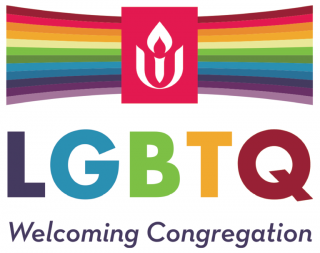An LGBTQ Welcoming Congregation

As a Welcoming Congregation, we have pledged to:
- honor the lives of all people and equally affirm displays of caring and affection without regard for sexual orientation.
- celebrate diversity by using inclusive language and content in worship.
- incorporate an understanding of the experience of lesbian, gay, bisexual, transgender, and queer persons throughout all of our programs, including religious education.
- affirm and celebrate lesbian, gay, bisexual, transgender, and queer issues and history.
- affirm marriage equality and conduct same-sex weddings.
- advocate for lesbian, gay, bisexual, transgender, and queer people, promoting justice, freedom, and equality in the larger society. We speak out when the rights and dignity of lesbian, gay, bisexual, transgender, and queer people are at stake.

Here at UUFF, we recognize that many of us were taught as children that we should assume other people’s pronouns, usually based on additional assumptions about that person’s gender. However, the practice of assuming another person’s pronouns, as well as assuming another person’s gender, does not honor that person’s identity and experience. (And it’s important to note that personal pronouns do not always have to do with someone’s gender or lack thereof at all!)
As part of our work to honor every person’s sacred worth and dignity, we are committed to referring to all people using the language they themselves determine to be most appropriate. This includes using pronoun series we may not be familiar with yet. Models of this might look like UUFF staff including pronouns in their email signature, worship leaders sharing pronouns from the pulpit on Sunday, or invitations from staff, committee chairs, or other members and friends to share your pronouns with them. We invite you to lean into this process, although it might seem uncomfortable or unnecessary. If so, we also invite you to ask yourself why that is. For more information on personal pronouns, we recommend visiting Shige Sakurai’s website MyPronouns.org, which includes excellent, in-depth resources and examples on engaging with personal pronouns in intentional and welcoming ways. (Much of the information in this message comes from the UUA).
In Faith and Healing,
Rev. Doug McCusker (he/his/him), UUFF Minister
roddy bell-shelton biggs (they/them), UUFF Intern Minister
